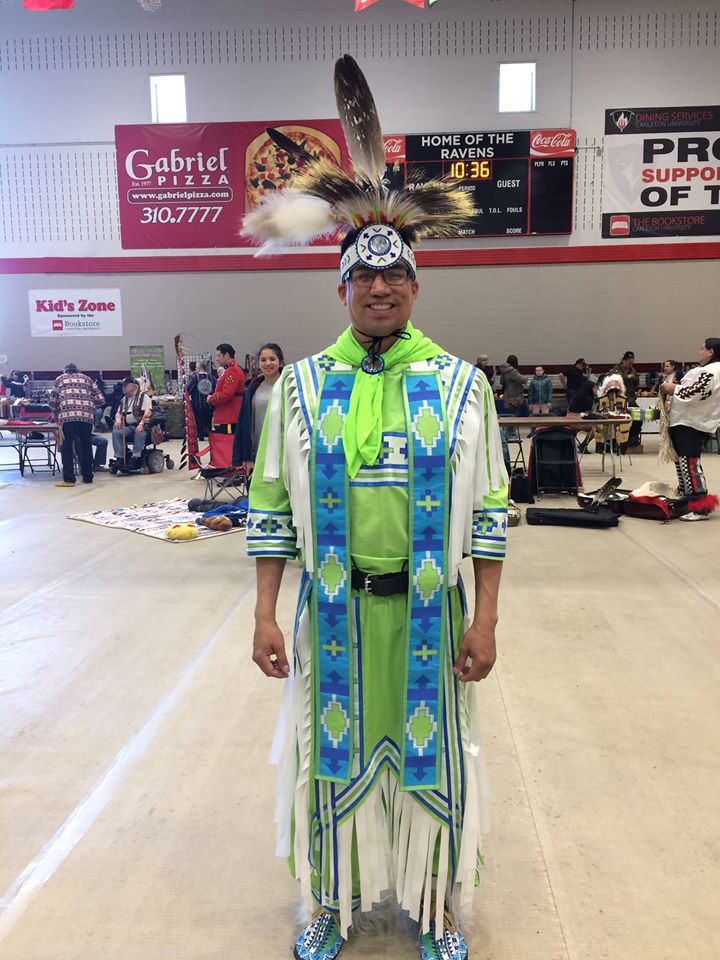Three years ago, when Randy Blue Kakegamik was taking a cab after his treatment care in Ottawa the driver asked what he was passionate about. “I told my new friend that I really didn’t know,” he said. “I had no idea what I was going to do. I thought about it and came to the realization of music.”
Kakegamik knew he was on the path to sobering up. He wanted to start a new, better life for him and his family.
This was when Kakegamik joined the Algonquin College family. He enrolled in the music industry arts program, and before that, he took on the digital music production program.
“I chose the digital music production program because of its part-time length,” said Kakegamik. “I was just fresh out of treatment and didn’t want to go full-on in a full-time program. I did this as to not stress myself out and to be safe for my sobriety.”
The start of Kakegamik’s new life has been helped by the college. His courses gave him the motivation to start up again. Involving his culture in his school life – Kakegamik is Oji-Cree – also helped. He makes frequent appearances at the college’s Mamidosewin Centre.
“I’ve involved myself quite a bit at the college interacting with our community, met some interesting people,” said Kakegamik.
He has also found joy in grass dancing, which is part of his culture. This is a traditional native dance that had always been attractive to him.
It was only just recently, however, that he discovered that in order to really enjoy the beat of the drums, he needed to be physically involved with the music. So he began to dance.
Dancing hasn’t just given Kakegamik the ability to go places that he’s wanted to go but also do things he’s really loved. It has really helped him.
“The grass dance is a healing dance of warriors,” he said. “It is also a dance of the society of grass dancers.”
Kakegamik is a father of two and a grandfather. His journey as a father has been good. Yet in the beginning, it was rocky. When he said to himself that he needed to sober up, he spoke to his son about his problem with alcohol. In turn, his son understood and always knew where he was during treatment.
“The rewards come every day with him,” said Kakegamik. “He’s a happy boy. We have a great relationship and very open. I’ve taught him a lot and he listens. I’m trying to do my best and I think he knows that.”
Ken Jackson, 34, a reporter for APTN news and a friend of Kakegamik admires how far he has come. “He’s honest and is trying to be a better person every day,” said Jackson. “He doesn’t hide his scars.”
The pair have been friends for four years after meeting in a coffee shop through a friend, Mark Marsolais. At the time, Marsolais was writing his own Gladue report, which is a document that supports Indigenous accused adults, youth and justice personnel in applying the sentencing principles set out in the Criminal Code of Canada and of the Youth Criminal Justice Act.
More recently, due to the pandemic that has occurred, Kakegamik finds himself exercising, beading, making music, cleaning, reading, and trying to learn a new language. He also reaches out to family. No longer being in school on campus hasn’t swayed Kakegamik’s morale.
“I’m slowly trying to find my bearings and keep busy now that our courses are proceeding,” he said. “I really am concerned for a lot of reasons and this school deal comes secondary. It is stressful to add on more things at this point. Being a parent and the worries I have are daily. Taking steps to push through [and stay] level headed is a challenge.”


